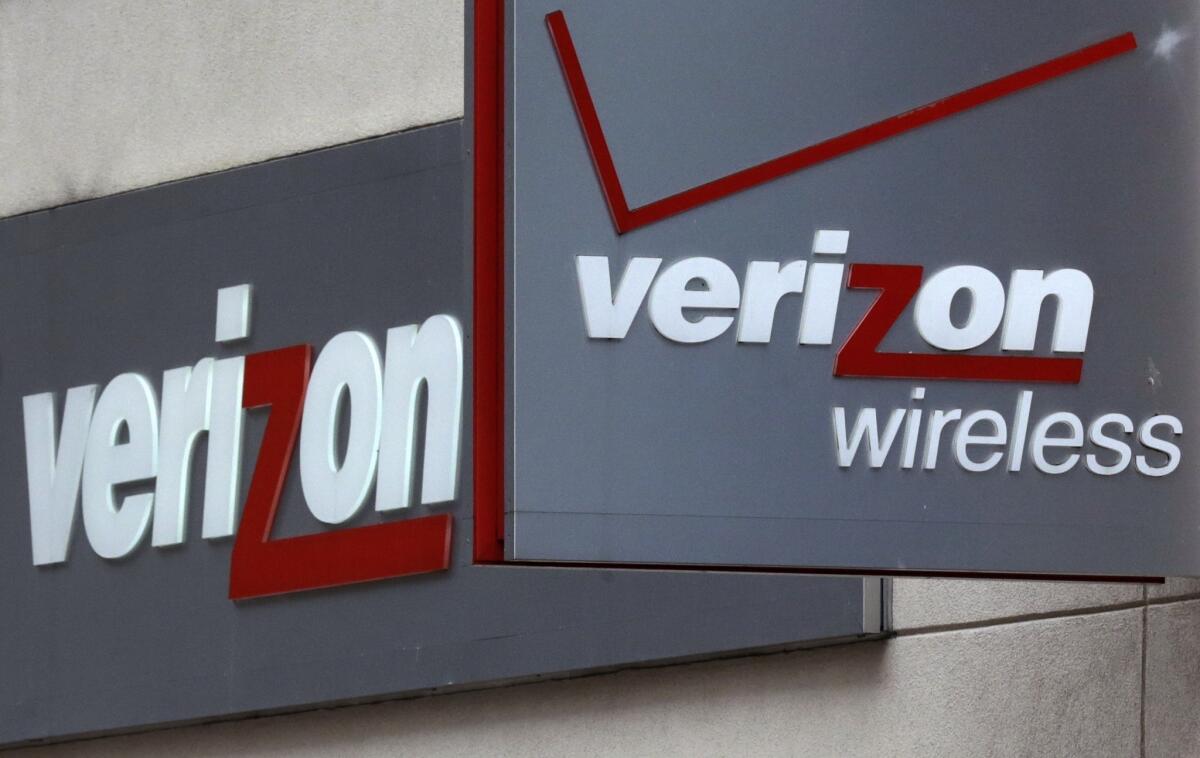Wireless carrier Verizon is also in the market for eyeballs

Signage is on display at a Verizon Wireless retail store at Downtown Crossing in Boston.
- Share via
Verizon has long been known as a home phone and wireless service provider. But it’s evolving to make more money by tracking what we watch and read on our phones.
About two-thirds of U.S adults now carry smartphones, according to the Pew Research Center, suggesting to some analysts that the market is peaking. But we’re spending more time on our pocket screens — about two-and-a-half hours this year, on average, compared to less than an hour in 2011, according to market research firm eMarketer. Magna Global, a unit of advertising firm IPG, predicts that digital media ad sales will grow 62 percent this year on mobile.
So Verizon is preparing its next act by beefing up its advertising and media business. It spent $4.4 billion earlier this year to snap up AOL, which runs a digital-ad business as well as big Internet sites such asTechCrunch and the Huffington Post. It has also started tracking its mobile users’ Internet surfing and other online behavior via controversial identifying code called “supercookies.”
Verizon’s traditional business is still doing just fine. The New York company said Tuesday that third-quarter revenue rose 5 percent to $33.2 billion, while net income climbed 9.9 percent to $4.17 billion.
That makes mobile ads and video “an investment in the future,” as eMarketer analyst Martín Utreras puts it, one that for now remains a small part of Verizon. The company is the country’s biggest wireless carrier and sells phone, Internet and TV service to millions of homes and businesses. It doesn’t break out advertising revenues.
“Verizon kind of gave us a clue with where they’re going with this with the launch of Go90,” Utreras said. Go90, launched in October, is a free mobile video service that offers full episodes of TV shows such as “The Daily Show” and MTV’s “Catfish,” sports, news and online video.
But it’s a saturated market for online video, and some analysts have slammed Go90 as clumsy to use. Verizon didn’t offer any updates Wednesday as to how many people had signed up.
Nomura analyst Jeffrey Kvaal says the company expects to make money from mobile video by selling customers bigger data packages to handle data-hungry video. Verizon will likely also sell “pay-per-view” opportunities to big events such as concerts.
And, of course, there’s always advertising. “Instead of doing broad-brush marketing, we can go in and specifically target the individual with the ad,” Verizon CEO Lowell McAdam told an investor conference in September.
But Verizon’s plans on that front have been controversial. It now deploys its “supercookie” tracking code, which individuals can’t readily block on their own, to easily follow the way people use apps and surf the Web on Verizon phones. That information helps Verizon sell potentially lucrative targeted ads.
The company, however, has pulled back from what critics considered some of its more invasive early practices, says Nate Cardozo, a staff attorney at the Electronic Frontier Foundation. Previously, other companies could also track you using Verizon’s supercookies; that’s now more difficult. And Verizon now lets customers opt out if they call 1-866-211-0874 or go to vzw.com/myprivacy.
Once Verizon merges the AOL ad network with its own ad programs next month, it plans to limit its tracking to traffic to Verizon’s universe of sites as well as ads on other sites that use AOL’s wide-ranging ad network.
That’s still a lot of sites where Verizon will track its customers — potentially tens of thousands of them, says Cardozo. Verizon spokesman Ed McFadden said the company isn’t discussing those numbers.
MORE FROM BUSINESS
Amazon boosts holiday hiring, signaling shift in retail jobs
Waze navigation app says battery drain ‘significantly’ improved in revamp
Tesla shares dive after Consumer Reports yanks recommendation for Model S
More to Read
Inside the business of entertainment
The Wide Shot brings you news, analysis and insights on everything from streaming wars to production — and what it all means for the future.
You may occasionally receive promotional content from the Los Angeles Times.










